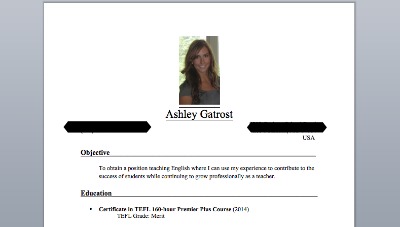
When I first looked into how to get a job teaching English abroad, I was completely overwhelmed. I had no information whatsoever and a handful of questions. It can be a little frustrating at first if you have no idea where to begin. So, I’ve done the easy part for you. Here is my guide to help you navigate the waters of applying for an ESL job (which means English as a Second Langauge, by the way).
1. Get Certified

While it is not completely mandatory to get certified to teach abroad, it will greatly help your chances of securing a job teaching abroad. This is the first step I took before even considering what countries I wanted to apply to. Plus, it will help give you the knowledge and confidence needed when you get that interview!
Not everyone will require you to have a teaching certification, but most do. I recommend it because not only does it provide you with great information, it shows your future employer that you are serious about teaching English abroad.
Types of Certification:
There are 3 main types of certification: TEFL, TESL or TESOL.
TEFL (Teaching English as a Foreign Language): teaching in countries where English is not the primary language.
TESL (Teaching English as a Second Language): teaching in an English-speaking country to students whose first language is NOT English.
TESOL (Teaching English to Speakers of Other Languages): a general name that includes both TEFL and TESL.
There’s also a fourth certification that you will probably come across as well: CELTA.
CELTA (Certificate in Teaching English to Speakers of Other Languages): A CELTA degree is the original TESOL training program and is done by Cambridge English. It’s also probably the most internationally recognized. While a CELTA degree is more official, most positions I found did not require it. A TEFL degree is more commonly listed in the requirements.
If you’re here, it’s because you want to teach English abroad, so a TEFL degree would be sufficient. However, if you have a particular country or program in mind, I would recommend researching their requirements to make sure you invest in the correct course. If you think you might want to teach English in your own country at some point, you may want to do a TESOL degree, which encompasses both.
I chose to get a TEFL degree, as I only planned on teaching abroad. I still teach ESL, but I teach online to students in China. My TEFL degree was still sufficient for teaching online.
Two Ways to Get Certified:
You can get certified online or through an in-person course that requires you to complete several hours of actual teaching. You will soon find that there are a number of different courses you could take and they all vary when it comes to price. Some look more official (British something or other) and will run you several hundred dollars. Others will look quite unofficial, will cost a lot less and will leave you wondering if it would even be considered legitimate. I decided to really take my chances and got a Groupon deal off the Internet for a company called TEFL Express and it cost me $69.
No matter which course you take, they all will provide you with helpful information. It doesn’t matter if you spend several hundred dollars or $69. The important thing is how many hours your course is.
How many hours do you need?
Most employers want you to complete at least 120 hours for TEFL, so do not do any less if it is offered as an option. Mine was for 160 hours and it included a course on TKT (Teacher Knowledge Test). Depending on how much time you have, the course can take about 4-6 weeks to complete. Not having anything better to do, I finished mine in a little over 2 weeks (I was putting in some serious hours).
Once I finished the course, I applied for my certificate and had it emailed to me right away. There was also an option to have a hard copy mailed to me, but I never had a problem with just having an online copy. Nor did I ever have a problem with my cheaper, questionable certification. I paid less and got a much longer course.
My online course obviously didn’t have the opportunity to get in-class teaching hours. But again, I never had a problem.
2. Write your resume and cover letter.

You most likely have a resume already written, but just like for any job you apply to, you need to fine-tune it for a teaching job abroad.
Resume
I came across a lot of employers who requested that a current picture be attached to your resume. Don’t attach a picture separately. Take the time to rearrange your resume with a picture at the top and then save it as a PDF so there won’t be formatting differences when opening it. Make sure to include any jobs that remotely resemble teaching, English/writing, traveling or working with people from different cultures. Be sure to include any knowledge of foreign languages as well.
Cover letter
Attach a cover letter that expresses your interest in the job or company. Make sure you include why you want to teach abroad and what assets you could contribute to the school/company. This is where you can talk more in-depth about your experiences and degrees. Try to make it 1 page in length—any less and people will think you don’t have enough to say, any more and they will get tired of reading.
3. Pick a country.

Once you have gotten certified and have written your resume, then comes the fun part: deciding where in the world you want to go. There are usually several factors that people consider when looking into teaching jobs abroad: funding, salary and location.
Funding First.
The first thing to consider is funding. A lot of countries and companies offer decent funding to help you live and work abroad and others do not. Quite simply, do you have enough money to sustain yourself while living abroad or do you need as much help as you can get? This will factor into choosing a location because certain areas of the world will offer to help with your expenses and others will only pay you a salary.
South America
South America tends to have lower salaries (around $400-600 per month) and (from what I have seen) does not help with housing expenses or flight reimbursement. As you can imagine, $400 would be very hard to live off of even if you had your apartment paid for.
Europe
Europe seems to be where the least number of available jobs are. I have seen countries offer a salary of anywhere between $800-1,400 per month to teach in Europe, BUT it’s like seeing Batman. IF you see a job position open up, it will probably be gone the next time you look. I rarely find jobs in Europe. They still exist but you may need to be a little more diligent in looking or a little more patient to find the right one.
The Middle East
The Middle East has had more and more positions open up. Some jobs offer a very competitive salary, quite possibly one of the highest. Funding is usually very good, consisting of flight reimbursements, furnished apartments, health coverage and generous paid time off. Most positions being offered are in Saudi Arabia and the UAE. Salaries can range from $3,000-4,000 per month. Remember though, the UAE and other places in the Middle East generally have a higher cost of living.
Asia
Asia seems to be the front-runner for teaching positions. There are many positions available in Vietnam, Thailand, China, Taiwan, Cambodia, Indonesia, Japan and South Korea. With a little digging, you can probably find just what you are looking for.
Japan and South Korea have government-funded programs which will provide you with all the necessities to live and work abroad. However, these programs are stricter with their requirements. Other countries offer competitive salaries with housing, help with visas, flight reimbursement and/or health insurance. These things will vary between jobs so it will depend on what you want and need. Salaries typically range between $1,000-2,500 per month.
Things To Keep in Mind:
- Salaries depend on cost of living, so the higher the salary, the higher the cost of living.
- When you are trying to pick a city and think, “Well, it’s close enough to a cool city. I could go there on the weekends.” DON’T. ‘Close enough’ is not there. And even though ultimately you may be using this job to see other parts of the world, you still have to live in your city for an extended amount of time, so pick somewhere you can see yourself enjoying.
- Make sure to check the requirements of a job and/or country before getting your hopes up. Some jobs require 2 years experience, no exceptions. Other jobs want a CELTA teaching certificate. Even further, some countries require a national background check using your fingerprints. ANYthing on your record and you will not get the job (this includes DUI). Korea and Japan are very strict about having a clean record.
- Is a recruiter necessary? No. Should you pay for a recruiter? Never. I ended up applying for a job that was listed by a recruiter and after speaking with them about where I wanted to go, I was actually placed in a different location they had open. They can certainly help you find job opportunities but you should never pay for one.
Where to begin:
One of the most popular job sites is Dave’s ESL Café, so I would start there. They make it incredibly easy to search for jobs in particular countries. Simply type in something like “Teach in Thailand” and they will show you what jobs are available.

Jobs are listed everywhere and there are numerous sites to look on. If you are interested in the government-funded programs, JET is the program for Japan and EPIK is the program for South Korea.
4. Apply.
Once you filter through all the job requirements and decide where you would like to go, follow the instructions on the job posting and apply. Simple. Attach your resume and cover letter and write a smart sounding email about your interest in the position listed. Include your contact information in the email so they don’t have to go back and forth.
The Interview
This can be a little nerve-wracking as it’s the only thing standing between you and your time abroad. Most likely, this will be a Skype interview on video, so dress smart and act as if you are in an office and not at home. Clear the background behind you so it’s not cluttered and they can focus on YOU. Common questions will be about your resume and experience that you listed. Be prepared to talk about anything you listed and wrote in your cover letter. This is also a good time to refresh yourself on the ESL course you took because I was asked several questions about teaching young learners and how I would react in certain situations.
Getting the Job
Once you accept a job teaching English, you will apply for your visa and start packing! I was offered my job immediately and had a contract within 2 days. After obtaining a few documents and visa, I was off to China within a month.

5. Go Teach English Abroad!
How to get a job teaching English abroad can seem really overwhelming if you don’t know where to begin. Hopefully this guide helped you get on your way and off to see the world. Check out some of my adventures I had in China from my year of teaching!
PIN IT FOR LATER







Leave a Reply